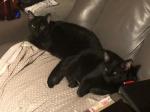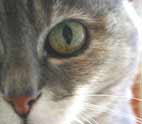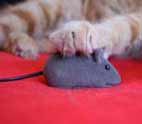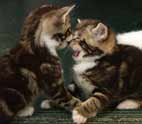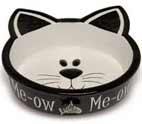A Fat Cat Is An Unhealthy Cat
How To Achieve Good Cat Health
Do you have a fat cat? If the answer to this question is yes then keep reading to find out why this is and what you can do about it.
If your answer is No! Then still keep reading to make sure you do not fall into unhealthy feeding routines in the future.
Why Are Our Cats Getting Fatter?
Just like many humans in today's world who are putting on weight due to over eating or eating the wrong foods, our pet cats are also suffering the same fate
Unfortunately as cat owners it is all our fault, unless of course your cat is suffering from an illness which is affecting their metabolism.
Why is it our fault? Well, we could either be serving bigger portions of food, feeding the wrong kind of food, giving them too many extra treats or generally making their lives less active.
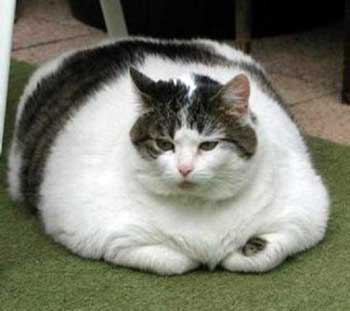
In the wild cats are meat eating hunters who are free to roam around outside all day catching their prey, defending their territory, playing, climbing trees and generally doing what cats like to do best, be cats.
All this activity helps to keep them fit and agile and burns off their calorie intake, but as more and more cat owners decide to keep their cats inside, these natural behaviours are restricted.
Just like bored humans a bored cat can also become lazy and eat for something to do and this is when excessive weight gain can become a problem.
This is where as cat owners we need to ensure that we don't end up with a miserable lazy fat cat, who finds it hard to get around.
Why Should We Worry About Our Cats Putting On Weight?
Quite simply a fat cat is an unhealthy and unhappy cat due to the fact that they will no longer be able to do all the things that cats like to do like:
- Climbing
- Chasing things
- Jumping
- Playing
They are also more likely to have shorter lives, as they are more prone to illnesses such as:
- Heart disease
- Diabetes
- Liver disease
- Arthritis
- Urinary Infections
How To Prevent Your Cat Putting On Weight
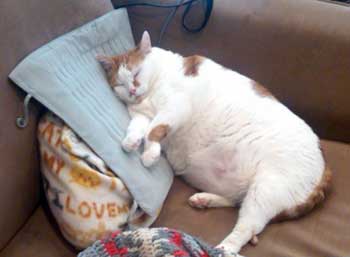
Most cat owners will decide to feed their cats a commercially bought cat food rather than making it from fresh.
This is understandable in this fast paced world, were cooking for our families can be hard enough. However, if you can provide your cat with fresh foods, you will at least know exactly what they contain and how calorific they are.
Most commercially bought food is specially balanced to be able to meet all your cats' nutritional needs.
However a lot of this food can contain more calories than their natural diet would have in the wild. Dry cat food is especially calorie laden and if left out for the cat all day to nibble on can soon lead to weight gain and a fat cat.
To make sure that we you are feeding your cat correctly you need to assess:
How much food you are giving them - it is important to feed your cat at fixed times during the day and keep treats and any extra food to a minimum.
Follow the guidelines on the packaging of the food you are serving as to how large a portion should be served at each meal in relation to the size and age of your cat.
What their lifestyle is - If your cat has little exercise they will require smaller portions of food. An active adult outside cat will require a full portion of food several times a day, whereas a older less agile cat will need fewer calories.
What sort of food we are feeding them - Combine wet food with some dry kibble in their meals, this will help to fill up your cat and keep them satisfied until the next meal.
Make sure you are feeding the best food you can afford and always check that the food is a complete food that contains all the nutrients a cat needs.
Exercise - include playtimes with your cat every day if you have an indoor cat and make their home environment as stimulating as possible by providing them with climbing trees and toys to keep them stimulated and active while you are away.
This will ensure that they burn off any excess calories and will also be much happier leaner cats.

